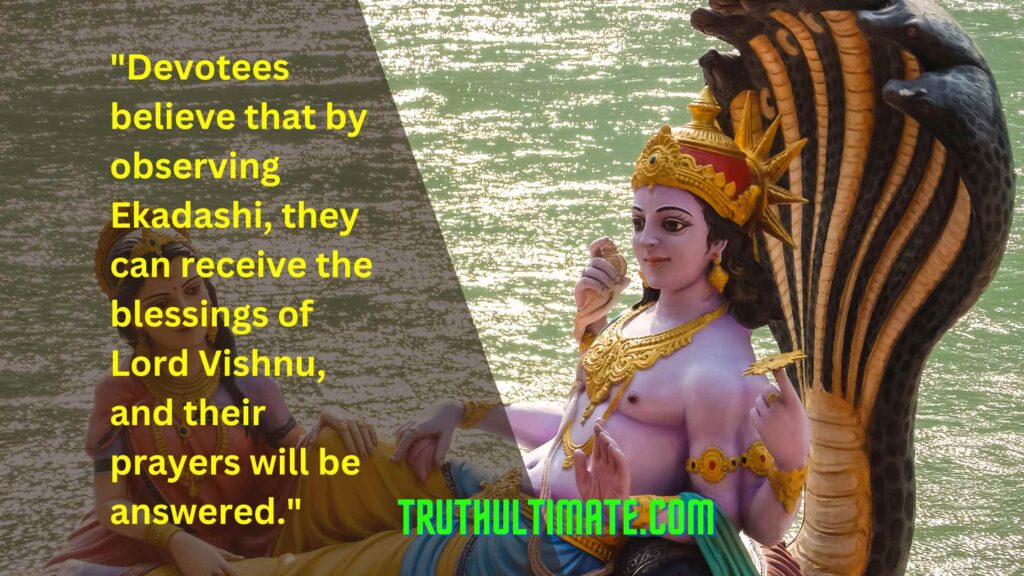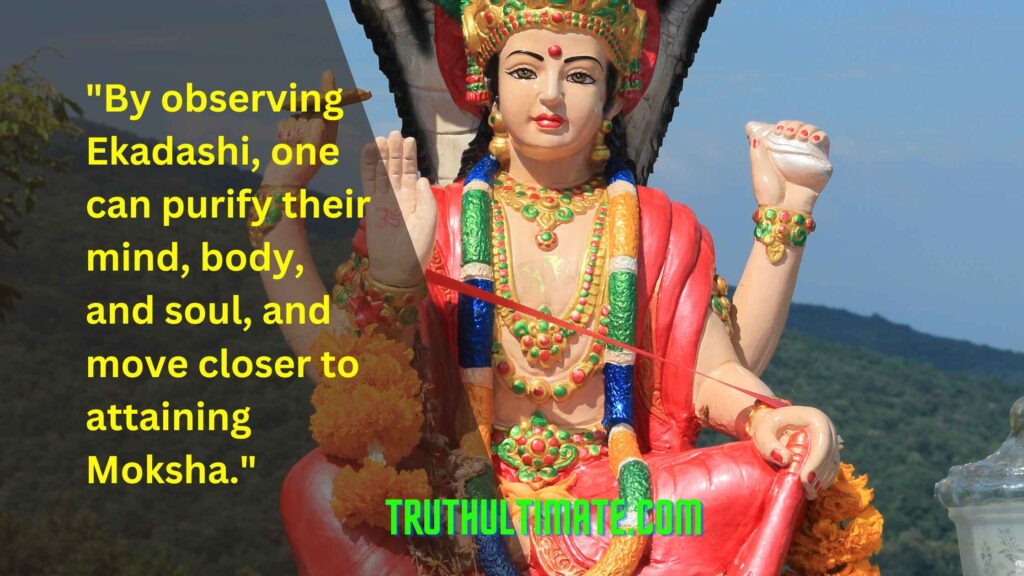Ekadashi Kab Hai is one of the most important quests as a Hindu observance that occurs twice a month in the Hindu calendar. It is considered a holy day that is dedicated to Lord Vishnu.
The word “Ekadashi” is derived from Sanskrit, where “Ek” means one, and “Dashi” means ten. This observance falls on the eleventh day of every fortnight, which includes both the waxing and waning phases of the moon.
It is believed that on this day, the power of Lord Vishnu is at its peak, and those who observe Ekadashi are blessed with spiritual growth and prosperity.
Ekadashi Kab Hai?
Ekadashi Kab Hai and the significance of Ekadashi can be traced back to the ancient Hindu scriptures. According to the Bhagavad Gita, Lord Krishna says, “Of all days, I am Ekadashi.”

This statement highlights the importance of this observance in Hinduism. There are several reasons why Ekadashi is considered a significant day in Hindu culture.
Firstly, it is believed that observing Ekadashi helps purify the mind, body, and soul. Fasting on this day is believed to detoxify the body and help one attain spiritual growth.
Secondly, it is believed that on this day, Lord Vishnu’s power attains its peak. Lord Vishnu is one of the principal deities in Hinduism, and he is considered the preserver of the universe.
Devotees believe that by observing Ekadashi, they can receive the blessings of Lord Vishnu, and their prayers will be answered.
Thirdly, it is believed that observing Ekadashi can help one attain Moksha, which is liberation from the cycle of birth and death.
Hinduism teaches that all living beings are caught in this cycle, and the ultimate goal of life is to break free from it. By observing Ekadashi, one can purify their mind, body, and soul, and move closer to attaining Moksha.
There are several ways to observe Ekadashi. The most common practice is to fast, which involves abstaining from food and water for the entire day.
Some people also avoid eating grains, beans, and certain vegetables on this day. It is believed that by fasting, one can detoxify the body and attain spiritual growth.
Fasting on Ekadashi is also believed to help one overcome their desires and develop self-control.

In addition to fasting, devotees also perform special rituals and prayers on Ekadashi. Many people visit temples and offer prayers to Lord Vishnu.
Some people also recite the Vishnu Sahasranama, which is a hymn in praise of Lord Vishnu. It is believed that reciting this hymn on Ekadashi can help one receive the blessings of Lord Vishnu.
Another important aspect of Ekadashi is charity. Devotees believe that by giving to the poor and needy on this day, they can receive the blessings of Lord Vishnu.
Many people donate food, clothes, and money to charitable organizations on this day.
There are several types of Ekadashi that are observed throughout the year. The most significant of these is the Vaikuntha Ekadashi, which falls in the month of December or January.
This day is believed to be the most auspicious of all Ekadashis, and it is said that observing this day can help one attain Moksha.
Another important Ekadashi is the Nirjala Ekadashi, which falls in the month of June. On this day, devotees observe a strict fast, where they abstain from both food and water for the entire day.
It is believed that by observing this fast, one can attain spiritual growth and overcome their desires.
Papmochani Ekadashi falls in the month of March and is believed to help one get rid of their sins.
It is believed that by observing this Ekadashi, one can seek forgiveness for their past sins and move towards a more virtuous life.
Kamada Ekadashi falls in the month of March or April and is believed to fulfil one’s desires. It is said that by observing this Ekadashi, one can get rid of negative thoughts and move towards a more positive life.
Varuthini Ekadashi falls in the month of April or May and is believed to be the day when Lord Vishnu wakes up from his cosmic sleep. On this day, devotees observe a fast and offer prayers to Lord Vishnu.

Apara Ekadashi falls in the month of May or June and is believed to bring prosperity and good fortune. It is believed that by observing this Ekadashi, one can overcome obstacles and achieve success in life.
Mohini Ekadashi falls in the month of May or June and is believed to be the day when Lord Vishnu took on the form of Mohini, a beautiful enchantress.
It is said that by observing this Ekadashi, one can attain happiness and contentment in life.
Devshayani Ekadashi falls in the month of June or July and is believed to be the day when Lord Vishnu goes into cosmic sleep. It is said that by observing this Ekadashi, one can attain spiritual growth and move towards a more peaceful life.
Putrada Ekadashi falls in the month of July or August and is believed to bless couples with children. It is said that by observing this Ekadashi, one can overcome their infertility problems and be blessed with healthy children.
Indira Ekadashi falls in the month of August or September and is believed to bring good fortune and prosperity.
It is said that by observing this Ekadashi, one can overcome their financial problems and move towards a more prosperous life.
Parivartini Ekadashi falls in the month of September or October and is believed to mark the change in seasons.
It is said that by observing this Ekadashi, one can overcome negative thoughts and move towards a more positive life.
In conclusion, Ekadashi is an important observance in Hinduism that is observed twice a month. Each of these Ekadashis has a unique significance and is observed in different ways.
By observing Ekadashi, devotees seek the blessings of Lord Vishnu and move towards a more spiritual and virtuous life.
There are some typical rituals devotees across India follow during Ekadashi. Devotees wake up early in the morning for taking a holy bath.
This is followed by placing an idol of Lord Vishnu and Goddess Lakshmi and lighting a diya with ghee. Lord Vishnu is then offered garlands, Panchamrit, and sweets by devotees.
Ekadashi Katha is then recited by devotees. Chants of “Om Namo Bhaghavate Vasudevaye” also happen simultaneously.
Devotees then visit the nearest temple dedicated to Lord Vishnu. In the end, the fast is broken by consuming Satvik food.
Ekadashi Kab Hota hain?
Ekadashi Kab Hai or Ekadashi kab hota depends upon the lunar cycles. Ekadashi occurs on the 11th day of the lunar cycle, twice a month. While the first Ekadashi of the month happens during the Krishna Paksha, the second Ekadashi happens during Shukla Paksha.
Ekadashi Kab Hai 2023
Ekadashi Kab Hai in the year 2023 gives you a summary of all events in the year. In 2023, Ekadashi will occur 25 times. Usually, Ekadashi comes twice a month.
Nirjala Ekadashi 2023
Nirjala Ekadashi 2023 is a significant Hindu festival that is celebrated with great enthusiasm and devotion in India.
It falls on the 11th day of the waxing phase of the Hindu month of Jyestha, which generally falls in the month of June. Nirjala Ekadashi 2023 is considered to be the toughest and most stringent Ekadashi among all the Ekadashis.
On this day, devotees observe a complete fast, which means they abstain from both food and water for 24 hours. This fast is believed to purify the body and mind and help one attain spiritual growth.
Nirjala Ekadashi 2023 has its own significance that every devotee has to understand. The word “Nirjala” means ‘without water’, and as the name suggests, Nirjala Ekadashi is observed without consuming even a drop of water.
One of the toughest of all Ekadashis, on this day, devotees go without food and water for the entire day. It is believed that observing a fast helps in attaining spiritual enlightenment and getting rid of all sins.
Nirjala Ekadashi 2023 will be observed on Tuesday, 13th June. It is believed that observing Nirjala Ekadashi with devotion and sincerity can bring one closer to Lord Vishnu and bestow them with his blessings.
To understand Nirjala Ekadashi 2023 better, one needs to go through the legend of this Ekadashi. According to Hindu mythology, Nirjala Ekadashi is associated with the story of Bhima, one of the Pandavas.
Bhima was known for his enormous appetite, and he found it difficult to observe the traditional Ekadashi fast that required him to consume only fruits and milk.
To overcome this, he approached sage Vyasa, who advised him to observe Nirjala Ekadashi, the most stringent form of the fast.
Initially, Bhima found it difficult to observe this fast without water, but he persevered, and with his devotion, he pleased Lord Vishnu, who appeared before him and blessed him with strength and longevity.
It is believed that observing Nirjala Ekadashi with devotion and sincerity can bring one closer to Lord Vishnu and bestow them with his blessings.
Like in all previous years, Nirjala Ekadashi will be celebrated with great devotion and enthusiasm throughout India in 2023.
It will be common to see devotees following a set routine on this day, like waking up early in the morning, taking a bath, and offering prayers to Lord Vishnu.
Devotees will then observe a complete fast, which means abstaining from both food and water for the entire day.
Devotees believe that by observing the fast during Nirjala Ekadashi in 2023, they can purify their bodies and mind and bring themselves closer to attaining spiritual enlightenment.
During Nirjala Ekadashi 2023, devotees can be seen visiting temples and offering special prayers to Lord Vishnu.
You will also find some devotees performing Yagnas and other religious rituals for seeking blessings and good fortune.
The day ends with the breaking of the fast, which is done after offering prayers to Lord Vishnu.
Some precautions need to be taken if you intend to observe Nirjala Ekadashi 2023. These precautions need to be taken especially because you will be abstaining from both food and water for the entire day.
Here are some precautions that need to be taken:
- Those who have underlying medical conditions should consult a doctor before observing this fast.
- Pregnant women and children should not observe this fast.
- Devotees should avoid any physical activity and rest as much as possible.
- It is essential to break the fast in the right way and avoid overeating.
Ekadashi Vrat 2023 Dates
Ekadashi Kab Hai answers you can find all the holy dates of Ekadashi in one place in the following table.
| Ekadashi | Date | Timings |
| Vaikuntha Ekadashi | Monday, 2nd January, 2023 | Starts at 7:11 pm on Jan 1 and Ends at 8:23 pm on Jan 2 |
| Shattila Ekadashi | Wednesday, 18th January, 2023 | Starts at 6:05 pm on Jan 17 and Ends at 4:03 pm on Jan 18 |
| Jaya Ekadashi | Wednesday, 1st February, 2023 | Starts at 11:53 am on Jan 31 and Ends at 2:01 pm on Feb 1 |
| Vijaya Ekadashi | Thursday, 16th February | Starts at 5:32 am on Feb 16 and Ends at 2:49 am on Feb 17 |
| Amalaki Ekadashi | Friday, 3rd March, 2023 | Starts at 6:39 am on Mar 2 and Ends at 9:11 am on Mar 3 |
| Papmochani Ekadashi | Saturday, 18th March, 2023 | Starts at 2:06 pm on Mar 17 and Ends at 11:13 am on Mar 18 |
| Kamada Ekadashi | Saturday, 1st April, 2023 | Starts at 1:58 am on Apr 1 and Ends at 4:19 am on Apr 2 |
| Varuthini Ekadashi | Sunday, 16th April, 2023 | Starts at 8:45 pm on Apr 15 and Ends at 6:14 pm on Apr 16 |
| Mohini Ekadashi | Monday, 1st May, 2023 | Starts at 8:28 pm on Apr 30 and Ends at 10:09 am on May 1 |
| Apara Ekadashi | Monday, 15th May, 2023 | Starts at 2:46 am on May 15 and Ends at 1:03 am on May 16 |
| Nirjala Ekadashi | Wednesday, 31st May, 2023 | Starts at 1:07 pm on May 30 and Ends at 1:45 pm on May 31 |
| Yogini Ekadashi | Wednesday, 14th June, 2023 | Starts at 9:28 am on Jun 13 and Ends at 8:48 am on Jun 14 |
| Devshayani Ekadashi | Thursday, 29th June, 2023 | Starts at 3:18 am on Jun 29 and Ends at 2:42 am on Jun 30 |
| Kamika Ekadashi | Thursday, 13th July, 2023 | Starts at 5:59 pm on Jul 12 and Ends at 6:24 pm on Jul 13 |
| Padmini Ekadashi | Saturday, 29th July, 2023 | Starts at 2:51 pm on Jul 28 and Ends at 1:05 pm on Jul 29 |
| Parama Ekadashi | Saturday, 12th August, 2023 | Starts at 5:06 am on Aug 11 and Ends at 6:31 am on Aug 12 |
| Putrada Ekadashi | Sunday, 27th August, 2023 | Starts at 12:08 am on Aug 27 and Ends at 9:32 pm on Aug 27 |
| Aja Ekadashi | Sunday, 10th September, 2023 | Starts at 7:17 pm on Sep 9 and Ends at 9:28 pm on Sep 10 |
| Parsva Ekadashi | Tuesday, 25th September, 2023 | Starts at 7:55 am on Sep 25 and Ends at 5:00 am on Sep 26 |
| Indira Ekadashi | Tuesday, 10th October, 2023 | Starts at 12:36 pm on Oct 9 and Ends at 3:08 pm on Oct 10 |
| Papankusha Ekadashi | Wednesday, 25th October, 2023 | Starts at 3:14 pm on Oct 24 and Ends at 12:32 pm on Oct 25 |
| Rama Ekadashi | Thursday, 9th November, 2023 | Starts at 8:23 am on Nov 8 and Ends at 10:41 am on Nov 9 |
| Devuthana Ekadashi | Thursday, 23rd November, 2023 | Starts at 11:03 pm on Nov 22 and Ends at 9:01 pm on Nov 23 |
| Utpanna Ekadashi | Friday, 8th December, 2023 | Starts at 5:06 am on Dec 8 and Ends at 6:31 am on Dec 9 |
| Mokshada Ekadashi | Friday, 22nd December, 2023 | Starts at 8:16 am on Dec 22 and Ends at 7:11 am on Dec 23 |





